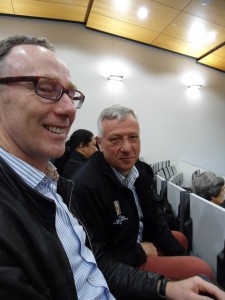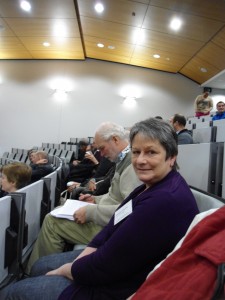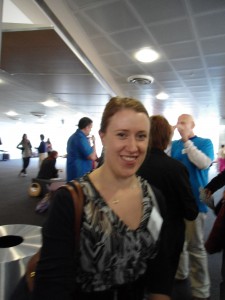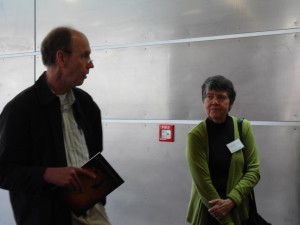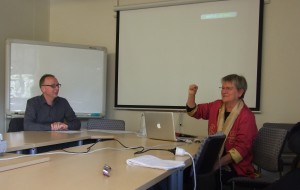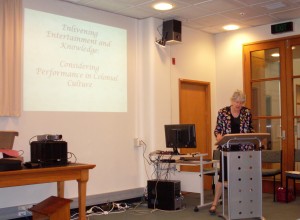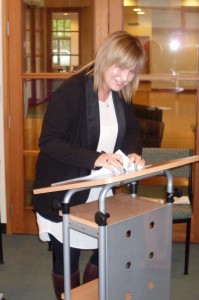Families and Colonialism
For those interested in the relationship between family, colonialism and settler culture we encourage you to read, and follow, the Families and Colonialism Research Network Blog created and managed by Emily Manktelow, Laura Ishiguro and Esme Cleal. Its a great way to keep informed of new books and journal articles in the field, as well as forthcoming research events.
Hawkes Bay Museum and Art Gallery
Are you fascinated by museums and material culture? Are you interested in following the exciting developments taking place at the Hawkes Bay Museum and Art Gallery? If so, we encourage you to follow the HBMAG Blog, which features articles about some of the amazing treasures held by the institution, as well as updates on the changes taking place at the museum.
Pacific History Association Conference 2012
Several members of the Centre for Research on Colonial Culture attended the biennial Pacific History Association Conference recently. Hosted by Victoria University of Wellington from 6-8 December, the conference drew together historians from across the Pacific.
Faculty and post-graduates from the University of Otago were there in large numbers, including two Centre members Lachy Paterson and Megan Ellison of Te Tumu: the School of Māori, Pacific and Indigenous Studies, who presented papers on the benefits and difficulties of utilizing indigenous-language texts within the practice of writing history. Megan focused specifically on Kāi Tahu writings and manuscripts, while Lachy presented a paper based on his current project, an anthology of Māori women’s writings from the 19th century.
Jacqui Leckie (Anthropology), Alumita Durutalo (USP), Louise Mataia (NUS) and Rosey Anderson (Otago), along with two Centre members, Angela Wanhalla and Judy Bennett, reported results from their collaborative Marsden funded research project tracing the fate of children born to indigenous mothers and American servicemen in the South Pacific during World War II.
Rosey Anderson’s paper based on her MA thesis research was a particular highlight. Her MA explores the history of a New Zealand Government scheme to bring Cook Island women to the country as domestic servants, while also tracing the impact of that migration on the women and their families.
The Centre for Research on Colonial Culture is based in the History and Art History Department at the University of Otago. This department has a proud record of producing excellent post-graduate research on colonial history and culture, and it was heartening to see this tradition continued at the Pacific History Association Conference this year.
Several former students gave well-received papers on their current research: Kate Stevens, who completed her BA (Hons) in History and Anthropology at Otago in 2008 and is now undertaking a PhD at Cambridge, gave a paper on British and French colonial legal regimes in the Pacific, focusing specifically on Vanuatu; Antje Lubcke (MA, Otago), gave an illuminating and excellent paper on photography in late 19th century Papua, which is the subject of her PhD at ANU; and Dr. Jonathan West, now working at the Waitangi Tribunal, presented new research on the effects of the earliest epidemic disease, known as rewharewha, upon Māori communities. The Centre has heard great things about the presentations of Otago’s current post-graduate students too and congratulates Rosey Anderson (Cook Island domestic servants), David Haines (shore-whaling on Banks Peninsula), and John McLane (Influenza Pandemic in the Pacific).
We also wish to congratulate Professor Judy Bennett whose new book, An Otago Storeman in Solomon Islands: The Diary of William Crossan, Copra Trader, 1885-86, was launched by Doug Munro at the Pacific History Association Conference. It is co-edited by Tim Bayliss-Smith (University of Cambridge), and was published by ANU-E Press. Congratulations Judy and Tim!
Gandhi and Slow Reading
The Centre was fortunate to have Isabel Hofmeyr (University of Witwatersrand) give a stimulating seminar on 3 December.
Professor Hofmeyr explored the presses of turn-of-the-century Natal, focusing specifically on Gandhi’s Indian Opinion, produced by the International Printing Company. Although this multi-lingual newspaper was originally based in Durban, Gandhi shifted it to his ashram at Phoenix in 1904, where its various inhabitants shared the production work. Professor Hofmeyr argues that Indian Opinion was printed not only inform and inspire people, but that its design was part of a larger vision to slow down the process of reading, that he saw increasingly tied to the pace of modern industrialized life. Gandhi’s experiences in newspaper publishing helped develop his later philosophy.
Professor Hofmeyr’s seminar is based on research that will be appearing in Gandhi’s Printing Press: Experiments in Slow Reading (Harvard University Press, forthcoming 2013). We urge you to buy it!
Vicente Diaz Seminar
The Department of History and Art History and the Centre for Research on Colonial Culture are delighted to be hosting a talk by renowned indigenous scholar, Vicente M. Diaz (American Indian Studies and Anthropology, University of Illinois at Urbana-Champaign). The talk will take place on Tuesday 11 December at 10.00-11.15 AM in the History & Art History seminar room, 2N8, Burns Building. His title is: ‘Voyaging Ancient Futures’
Abstract: This multimedia talk presents two decades of outrigger canoe voyaging in Micronesia, and in the US Heartland (Michigan and Illinois), to broach alternative ways of reimagining the links between history and future, and links between narratology and archives. This work ranges from building and sailing traditional voyaging canoes to more recent work in advanced visualization technology (3-D, Virtual, and Augmented Reality) enroute to producing virtual voyaging and simulating atolls and their cultural practices as a counter archive.
Practice Conference Presentations
Megan Ellison and Lachy Paterson of Te Tumu are two thirds of the panel “He Kōrero, he Tuhituhinga: Utilizing Indigneous-Language Texts”, presenting at the upcoming Pacific History Conference in Wellington later next week.
They will be giving their presentations as a “dry-run” at 2pm on Monday (3 December) in Te Iringa Kōrero (R3S10) on the third floor of Te Tumu.
Lachy’s topic is “He Reo Wāhine: Māori Women’s Voices from the Nineteenth Century” which discusses Angela Wanhalla’s and his research on Māori women’s voices in the archives. Megan’s topic, “Te Ripa Tauārai o kā Reo e Rua: the Crossroads of Two Languages”, investigates some of the texts she will be using for her doctoral study.
If interested, please feel free to come along.
Presenters Perform
A very successful symposium on Colonial Performance was held at the Hocken Collections Seminar Room on Monday, November 19th. Presenters gave illuminating talks on a wide range of colonial performances from Irish drama in Dunedin, to Maori performers in Manhattan, to the theatre of the Dunedin police court, among other topics.
Barbara Brookes, who convened the day-long symposium, kicked off the event with a discussion of touring medical lecturer Dr. Anna Longshore Potts.
Barbara was followed by two presentations on the theatre scene in Dunedin. Lisa Warrington invited us into Dunedin’s first theatre, a converted horse stable, and Peter Kuch drew attention to the importance of Irish drama in the development of Dunedin theatre during the 1860s. Kirstine Moffatt entertained us all with stories about the amateur pianist, who appeared in private homes, at concerts held in church halls, and barns.
Unlike Richard John Seddon, who spoke for hours at a time, Tom Brooking used a mere 20 minutes to describe the role of performance in colonial politics. At the same time he revealed some of the popular prejudices against Seddon in New Zealand’s historiography. Rosi Crane drew upon her doctoral research in the history of science to show how university professors used their role as public intellectuals to advance scientific understanding, for example in the field of evolution.
Bronwyn Dalley gave a vivid account of the many re-inventions of ‘urban investigator’, free-thinker and spiritualist, Lotti Wilmott in 1880s Christchurch. The tensions between ethnographic ideas about race and “primitive” societies were put to the test by the appearance of Maori performers at New York City’s Hippodrome in 1909-10. Marianne Schultz, from Auckland University, also explored how the leaders of the US suffragette movement used the case of Maori women, who had the right to vote, in their own campaigns for enfranchisement. Michelle Willyams also looked at Maori performers and performance, highlighting the hybrid nature of the musical repertoire developed by Reverend Seamer’s Waiata Maori Choir in the 1920s and 1930s.
University of Otago MA student Fabia Fox walked us through the streets of nineteenth-century Dunedin, and into the backyards of homes in the ‘Devil’s Half-Acre’ famous for its criminal underclass. Their exploits were often played out in the Dunedin police court, and relayed to a voyeuristic reading public through the column of the court reporter. In contrast, John Stenhouse embellished his talk on the Rev. Rutherford Waddell with his own rendition of excerpts from his famous sermon on the sin of cheapness. Prof. Lyn Tribble (English) eloquently wrapped up the day, drawing together the various themes into what she described as an ecology of performance.
Imperial Science Lecture
Imperial-Science1 In association with a symposium on the naturalist John Buchanan, a public lecture will be held at the Hutton Theatre, Otago Museum at 5.30, 29 November. Dr Jim Endersby will be talking on “Imperial Science: the Invention of New Zealand’s plants”.
Research Seminar
Webs of Empire
Tony’s Ballantyne’s new book, Webs of Empire, is capturing the attention of New Zealand media. Listen to Tony talk about his new book on Waatea News to find out how Gore and Chicago are connected, the important links between Māori and Asia, and the processes and practices of colonial knowledge production.

